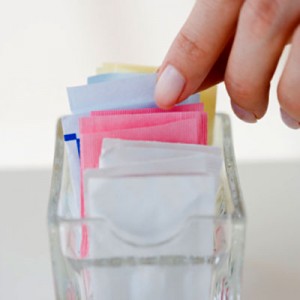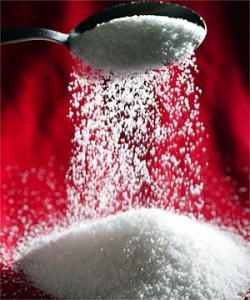 Sugar substitutes can be in either natural or synthetic form. All sugar can add to the body’s toxic load, so moderation and product knowledge is key to minimizing your risks.
Sugar substitutes can be in either natural or synthetic form. All sugar can add to the body’s toxic load, so moderation and product knowledge is key to minimizing your risks.
Here is a list of some of the most common synthetic sugar substitutes:
Acesulfame Potassium is used in soft drinks, gelatins, and chewing gum. This sugar substitute “might” be linked to cancer and requires further testing.
Aspartame, Equal, & NutraSweet are synthetic sugar substitutes and are used in drinks, gum, yogurt, and baked goods. Aspartame has been accused of causing everything from weight gain to cancer.
Neotame is used in drinks, dairy products, frozen desserts, and fruit juices. This artificial sweetener is between 7,000 and 13,000 times sweeter than table sugar and is produced by the same company that makes aspartame.
Saccharin is a synthetic sugar substitute used in Sweet’N Low and is found in many drinks, canned goods, and candy. Studies in the early 1970s found a link between consuming Saccharin and bladder cancer, prompting in 1981 that all foods containing it must contain a warning label.
Rebiana is used in many diet drinks, and yogurt. Derived from the stevia plant, rebiana is deemed the natural alternative to artificial sweeteners. It has been linked to DNA damage and requires further testing.
High-fructose corn syrup used in thousands of processed foods including soft drinks, baked goods and cereals. This sweetener contains the sugars fructose and glucose from processed corn syrup.
Sugar substitutes trick your body into gaining weight by turning off your body’s appetite control system and fooling your bodies metabolism.
Sugar and sugar substitutes brake down in your liver like alcohol, and produces many of the side effects of chronic alcohol use.
Two sugar substitutes that are from the plant kingdom are: Stevia, a highly sweet herb derived from the leaf of the South American stevia plant and cane sugar. Both of these sugar substitutes are safe in their natural form and can be used to sweeten most foods.
Natural sweeteners such as honey and agave syrup may seem like a healthier choice, but they’re loaded with fructose and many products that use these sweeteners are highly processed.
The ingredients found in artificial sweeteners can cause inflammation, hormonal imbalances, and chronic disease such as diabetes, heart disease and cancer.
Be informed of the different types of sugar substitutes, and use all sugars, natural and synthetic in moderation. Understanding that sugar is found in most processed foods in several different forms, so try to incorporate more unprocessed foods, fruits, and veggies, and you will be on your way to a healthier diet.



